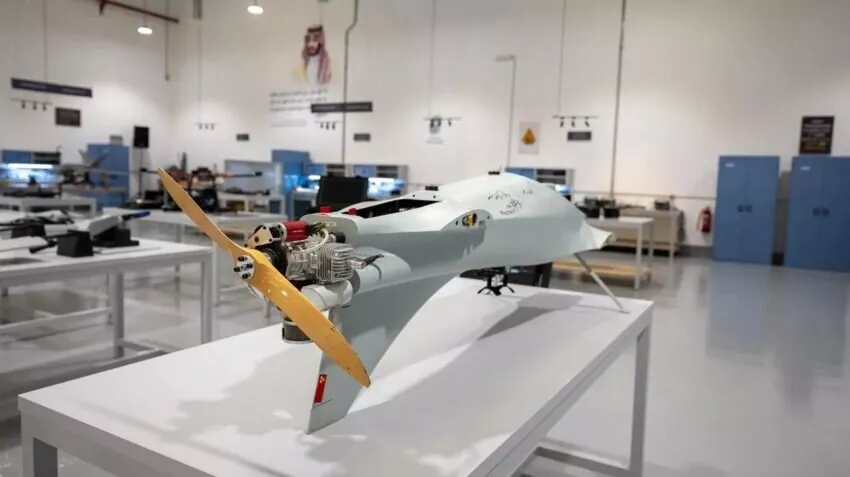Table Of Contents
In a groundbreaking announcement that underscores Saudi Arabia push towards technological innovation, the United Defense Company, a subsidiary of Qudra Holding, revealed its successful production of eight distinct types of drones equipped with advanced artificial intelligence (AI) technologies and high-resolution cameras. This strategic move aligns with the Kingdom’s Vision 2030, aiming to diversify the economy and boost domestic capabilities in both civilian and military sectors.
The factory currently operates with an annual production capacity of 300 drones, which can be doubled to 600 units depending on demand, according to Saudi Press Agency (SPA). These drones are the intellectual property of Saudi Arabia, designed and manufactured by local talent. This initiative is a clear testament to the country’s commitment to becoming a leader in AI-driven technologies and defense capabilities, positioning itself as a key player in the global drone market.
AI-Driven Features: A New Frontier in Drone Technology
The newly produced drones are embedded with some of the most sophisticated AI technologies, designed to tackle various tasks with unmatched efficiency and precision. By integrating machine learning algorithms and real-time data analysis, these drones can autonomously perform complex missions, requiring minimal human intervention.
One of the most innovative features of these drones is their ability to autonomously navigate challenging terrains using AI algorithms. Through continuous learning, the drones can adapt to changing environmental conditions and make real-time decisions during their missions. This ensures high accuracy, whether the drones are used for military reconnaissance or civilian applications like environmental monitoring.
For instance, the AI integration allows the drones to avoid obstacles automatically, rerouting themselves without the need for human input. This capability not only enhances mission success rates but also improves safety standards, especially in conflict zones or hazardous environments.
2. Advanced Surveillance Capabilities
Equipped with high-resolution cameras and infrared (IR) sensors, the drones are designed to excel in surveillance and reconnaissance operations. Whether it’s monitoring industrial activities, environmental changes, or military targets, the drones can gather critical information with unparalleled precision.
The AI-enhanced surveillance systems can process vast amounts of data in real-time, providing actionable insights that can be used to make informed decisions. This technology is crucial in military operations, where timely and accurate data can be the difference between mission success and failure.
Civilian and Environmental Applications
While the drones are designed to meet military needs, their potential for civilian applications is equally significant. Utilizing AI-driven analytics, these drones can be deployed in agriculture, environmental monitoring, and infrastructure surveillance. For example, they play a crucial role in tracking desertification, monitoring wildlife, and identifying environmental hazards.
By integrating AI and machine learning, the drones can detect patterns and anomalies in the environment, making them invaluable tools for government agencies, environmental organizations, and private enterprises.
Strategic Importance in Saudi Arabia’s Vision 2030
The introduction of these drones is part of a broader strategy by the Saudi government to enhance its technological and defense infrastructure. Under Vision 2030, Saudi Arabia aims to reduce its dependence on oil exports by investing in cutting-edge technologies like artificial intelligence and autonomous systems.
The General Authority for Military Industries (GAMI) has enacted policies that create a fertile ground for local and international investments in the defense sector. According to Fahad Al-Shammari, the factory’s director, these policies have attracted both domestic and international investors, further boosting the development of AI-powered technologies in Saudi Arabia.
Broader Implications for Global Drone Technology
This move reflects a global trend where artificial intelligence is becoming increasingly integrated into drone technology. Countries worldwide are investing in autonomous systems for both civilian and military applications. Saudi Arabia’s foray into this space is not only a significant step forward for the Kingdom but also a signal of the growing importance of AI in shaping the future of global defense and technological innovation.
1. Advanced AI Integration in Drone Systems
Globally, there has been a surge in the use of AI in drones, particularly in enhancing autonomous navigation, mission planning, and data processing. The Saudi drones incorporate these advancements, positioning the Kingdom as a potential export hub for advanced drone technologies.
By integrating AI-powered decision-making capabilities, these drones can autonomously adjust their flight paths, manage payloads, and process large datasets for real-time analysis. This makes them versatile tools for a wide range of applications—from military reconnaissance to logistics and natural disaster management.
2. Potential for Export and International Collaboration
With a production capacity that can be scaled up to 600 units per year, Saudi Arabia is well-positioned to become a significant player in the global drone market. The Kingdom’s focus on intellectual property and locally-manufactured AI technologies also opens doors for potential export opportunities. These drones could meet the growing global demand for autonomous systems in defense, logistics, and environmental monitoring.
Moreover, the Kingdom’s investments in AI and drone technologies could lead to international collaborations, particularly with countries looking to advance their autonomous defense capabilities.
The production of AI-powered drones by Saudi Arabia’s United Defense Company is a significant milestone, both for the Kingdom and the global drone industry. By leveraging artificial intelligence and cutting-edge technologies, Saudi Arabia is positioning itself as a leader in the development of autonomous systems for both military and civilian applications.
This initiative not only aligns with Vision 2030 but also demonstrates the Kingdom’s commitment to innovation, technological sovereignty, and economic diversification. As AI continues to play a pivotal role in shaping the future of global defense and technology, Saudi Arabia’s foray into drone production could become a model for other nations seeking to advance their capabilities in this rapidly evolving field.


